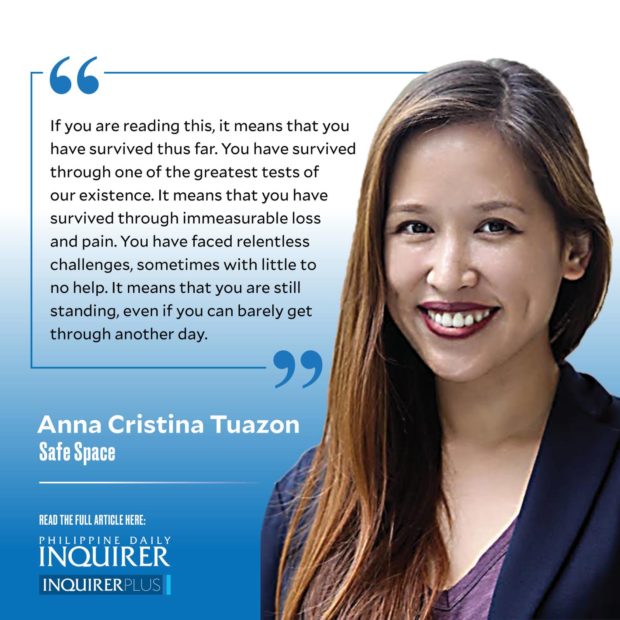This year’s holiday season has been an ambivalent one, to say the least. Some families were fortunate enough to spend it with each other for the first time since the pandemic started. Numerous holiday pictures feature their families holding framed photographs, marking the heavy loss of the past two years. As some have finally carved out enough sense of safety to be with their loved ones, others have not been so lucky and are spending it in quarantine. Others, still, have chosen to forego yet another family Christmas, mindful of the arrival of the Omicron variant on our shores. Our fellow Filipinos are also still acutely struggling with the aftermath of Supertyphoon “Odette.” They are dealing with long treks and long lines just to gather basic needs for their families. Some of them have spent the holidays with no water and electricity even as they are mourning for those who did not survive.
What does it mean to celebrate in a time of tragedy? This is the moral dilemma a lot of us face, especially in the last two years. In a time of pandemic, celebrations are hard-fought. Finding something to celebrate is already precious and rare; feeling permitted to do so is another challenge. We hold back on celebrating too loudly as a form of respect for others who are struggling and grieving. We put our holiday cheers on pause so as not to overshadow the cries for help. We quietly express our gratitude for what we are still able to do, with full recognition that not all can say the same. We may even set our own needs and wants aside and actively help and support others in their time of need. Respect and compassion are worthy values to uphold, especially in this season.
What may not serve us — and others — well is when we refuse to recognize hope and happiness. Some have mistaken refusing to be happy as a sign of compassion and respect for others. We deny ourselves from feeling anything but grief and suffering as a way to commiserate. We feel guilty whenever we experience a bit of joy and hope in the midst of so much loss. Some of us have somehow learned that feeling hopeless along with those who are suffering is what is needed.
But that is not the case. In psychotherapy, we teach therapists how to empathize and validate the suffering of their clients while still holding on to hope. A sense of hope is crucial if we are to help others. Hope allows us to continue looking for a way through. Hope allows us not to give up. Therapists who find themselves completely immersed in their clients’ suffering end up becoming hopeless themselves, rending them unable to help. We encourage our trainees to develop the strength to hold on to hope even in the most seemingly dire of situations. Not through blind hope or toxic positivity—which in its invalidation of the unpleasant reality gets people further stuck in their suffering—but through the realistic hope that as long as we’re alive and we don’t give up, we can find ways to make our lives worth living. People don’t feel helped when you simply show how much you’re sacrificing because of them; people get helped when help is actually given. People feel validated when you can understand and share in their suffering; they get helped when they are shown a way through. Validation is necessary and important, but it is not enough.
Celebration, when done right, can be used as a way of seeing through the suffering. We can celebrate what’s worth surviving for. We can recognize and respect the things that truly matter, especially in times of crisis. We can celebrate our tenacity and determination. We can celebrate our capacity to fight for and protect the values we hold dear. Celebration must be shared. Celebration should not be at the exclusion of others. We find reasons that everyone can celebrate in. We do not celebrate through ostentatious displays, or to show off or brag. We must celebrate what truly matters. That we are alive. That there are things still worth fighting for. That we are still here.
If you are reading this, it means that you have survived thus far. You have survived through one of the greatest tests of our existence. It means that you have survived through immeasurable loss and pain. You have faced relentless challenges, sometimes with little to no help. It means that you are still standing, even if you can barely get through another day. As long as we continue to survive, we have a chance to find our way through chaos and tragedy. More than ever, survival is something we must and should celebrate.


